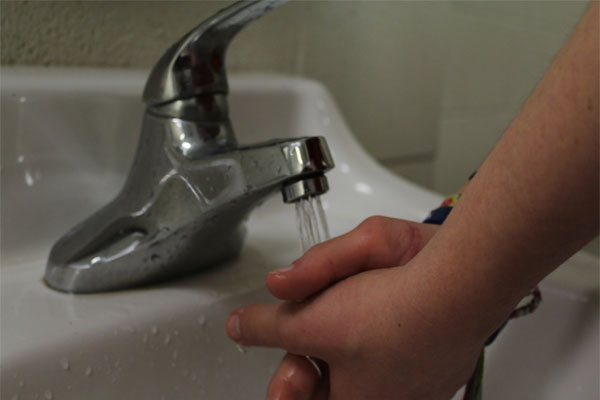The reality of Obsessive-compulsive disorder

There are various compulsions that result from the obsessive thoughts, one of the most well known being perpetual hand washing.
An anonymous student from Lambert High School defined Obsessive-compulsive disorder, commonly called OCD, as “someone must have things a certain way” and another student described it as “you have to be organized 24-7”. The general lack of knowledge regarding OCD makes it that much easier to misuse the term. Obsessive-compulsive disorder is officially defined as a psychiatric disorder in which people suffer from obsessive thoughts and compulsive actions. These thoughts and actions can altogether dictate the lives of those suffering from it, interfering with jobs, work, family, and various other facets of life.
However, this disorder is not the same for everyone, the majority of people suffering from OCD have a variety of symptoms, ultimately resulting in a need for routines and rituals in order to ease anxiety derived from obsessive thoughts. These obsessive thoughts can be in the form of intense terrors, recurring thoughts, or excessive doubt. The resulting compulsions can be a varied, such as repeated cleaning, constant counting, hoarding items, and perpetual checking of locks or stoves. These compulsions aren’t done by choice, those suffering from OCD are unable to stop their actions. They have the options of both cognitive behavioral therapy or taking medications such as Prozac and Risperdal.
The cause of this disorder has not yet being solidified. It is believed to be both biological and environmental. The biological aspect involves certain pathways of the brain that link areas dealing with judgment to areas revolving around bodily movements. There has been alternative evidence that OCD can also be inherited from parents. As far as the environment, stressors may trigger OCD within people that have a predisposed tendency for developing it. These stressors can include experiences such as abuse, illness, and a variety of relationship issues. However, OCD generally first appears in the early childhood or adolescence years.
This plethora of information just further proves the severity of this disorder, as it can consume entire lives and requires substantial treatment. Unfortunately, OCD is not always treated as seriously as it should be. Michelle Dalley, a therapist at Priory Hospital Chelmsford, stated, “It is a term which has become overused to describe anyone who demonstrates tendencies towards orderliness and perfectionism”. It isn’t just educated professionals who have noticed the incorrect connotation, but also those truly suffering from OCD. Lizzie Green, a 20-year-old who left school in London due to suffering from OCD accompanied with an eating disorder, claimed, “OCD is vastly different from being tidy. It shouldn’t be an adjective people throw around to describe themselves as. It is a serious illness and can dramatically affect someone’s life”. The side effects of the misuse of the term “OCD” have the potential to be drastic. Yulia Chentsova-Dutton, a cultural psychologist, stated, “When people have this common usage or knowledge of the term; it creates what we call a ‘cultural script.’” With a “cultural script” on a disorder such as OCD, the connotation can become positive and encourage OCD symptoms. This can lead to these particular symptoms being overlooked by both society and family members, harming those who are profoundly suffering. Around one in one hundred people in the United States suffer from OCD, 51% of those being severe. A severe disorder should not be synonymous with the concept of cleanliness.
It’s easy for people to separate themselves from all of this, to claim that they “would never, ever” incorrectly use the term OCD. However, through a recent poll conducted at Lambert High School, it has been made clear that the misuse of the term OCD is just as prevalent here as anywhere else. A Lambert High School student stated, “I feel like when people throw around the term it means something different than the actual disorder, in the sense that they’re not trying to make fun of OCD but just saying that there a neat freak”. I highly doubt that these students are trying to make fun of the disorder, but that doesn’t make it acceptable to incorrectly use the term. Half of the students surveyed claimed to hear the term OCD very often, a majority (22/31) of those students typically hear it coming from their peers and other adolescents. Educating the public on the reality of OCD would make it much harder to misuse the term, as everyone would understand the severity behind their words. OCD does not mean clean, and OCD is not a joke.
Your donation will help support The Lambert Post, Lambert High Schools student-run newspaper! Your contribution will allow us to purchase equipment and cover website hosting costs.













